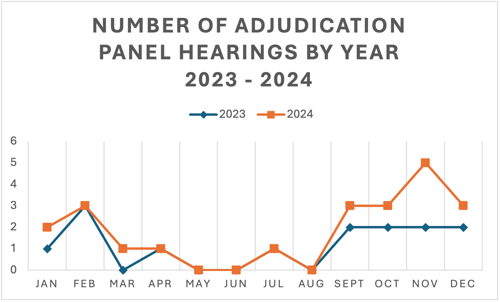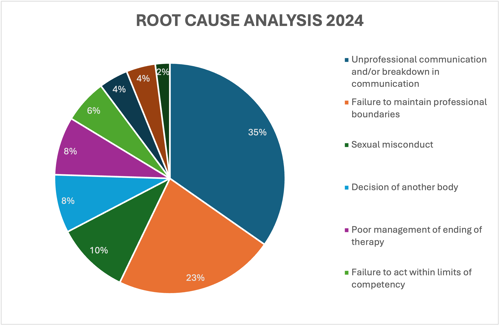
Understanding complaints: insights from the 2024 PCC annual report
Complaints received and referred in 2024
The Professional Conduct Committee (PCC) – who reviews complaints and advises on whether they should be referred to an adjudication panel – saw a sharp decline in the number of complaints received in 2024 compared to the previous year.
In 2024, the number of complaints received decreased by 56% in comparison to 2023. However, the number of complaints referred to an adjudication panel increased to 16%. In 2023, only 11% of complaints were referred. In total, we received 57 complaints, of which 48 were about registrants. Nine complaints were serious enough to be referred to an adjudication panel hearing. Despite the decrease in complaints received, the seriousness of the complaints that were made in 2024 meant that there was only a slight reduction in the number of adjudication panel hearings listed in 2024 compared to 2023.

The popularity of our annual Learning from Complaints event and the increased awareness around complaints and their prevention may have contributed to both the reduction of complaints received and the increase in the number of referrals to adjudication panels compared to 2023.
Another factor for the decrease in complaints received is the annual renewal declaration process that UKCP implemented in 2022. This process requires members to complete a declaration regarding any complaints or disciplinary action they have been subject to and to declare that they continue to comply with our Code of Ethics and Professional Practice (2019).
For further insight into the adjudication panels conducted in 2024, please refer to the PCC annual report for 2024.
Download the PCC Annual Report 2024
Comparison of the root cause analysis for 2024
In 2024, UKCP conducted root cause analysis of 37 cases. The data shows that some complaints had more than one root cause. It also revealed that cases with sexual misconduct as their primary root cause increased in comparison to preceding years, with sexual misconduct being the third most prevalent root cause for 2024. In 2023, it was the eighth most prevalent.

Unprofessional communication and/or breakdown in communication remains the most common root cause of complaints received in 2024 with 17 cases, as it did in 2023 with 24 cases. The second most common root cause across both years was failure to maintain professional boundaries with 11 in 2024 and 10 in 2023.
The reason that the first and second most common root causes of complaints remain the same could be because communication ranges from person to person. What one therapist and client may consider clear communication, another pair could misinterpret. Communication and the relationship built between psychotherapists and their clients remains central to therapy. Maintaining boundaries and encouraging clear, effective communication is the bedrock of a therapeutic relationship. Similarly, boundaries are central to maintain a distinct understanding of the relationship between therapist and client, which should also be communicated clearly to the client as per paragraph 8 of the Code of Ethics and Professional Practice (2019):
'Be aware of the power imbalance between the practitioner and client, and avoid dual or multiple relationships which risk confusing an existing relationship and may impact adversely on a client. If a dual or multiple relationship is unavoidable, for example in a small community, take responsibility for clarifying and managing boundaries and protecting confidentiality.'
The 2023 and 2024 root cause analysis indicates that boundaries and communication are intertwined with one another, and a lack of one or both within a therapeutic relationship could result in receiving a complaint.
Resources available to learn from complaints
- Our annual Learning from Complaints event, hosted by the PCC chair and the complaints team, explores a variety of case studies, complaint theory and the root cause analysis of complaints in 2024. This year's event is sold out, but a recording of the event will be shared with all UKCP members who receive our regular newsletters.
- Our Decisions and hearings page aims to protect the public by publishing the decisions of any hearings that result in a removal from the UKCP register. The publication of the decisions also aims to promote awareness of how the hearings are conducted, highlighting an independent panel’s insight into the complaint and how they came to their decision. You will also be able to view any active interim suspension orders.
- To research further into confidentiality, subject access requests and what to do with your notes, you can view our helpful guidance via the Learning from complaints: confidentiality page.
- Previous Professional Conduct Committee annual reports are available online to share insight into previous years statistics relating to complaints.
- If you are worried that you might have a complaint made against you, we have a helpful guide for psychotherapists that can be accessed at any time and covers a range of questions relating to the complaints process.

